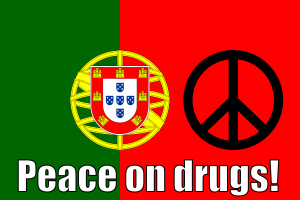
Im World Drug Report 2009 – United Nations Office on Drugs and Crime stellt das UNODC fest, dass die Entkriminalisierung in Portugal mit den internationalen Verträgen im Einklang steht. In Portugal hat „geringe Menge“ Drogen von der Strafverfolgung ausgenommen, sie sind allerdings weiter verboten und ordnungsrechtlichen Regelungen unterworfen.
Konkret schreiben sie:
The International Narcotics Control Board was initially apprehensive when Portugal changed its law in 2001 (see their annual report for that year), but after a mission to Portugal in 2004, it “noted that the acquisition, possession and abuse of drugs had remained prohibited,” and said “the practice of exempting small quantities of drugs from criminal prosecution is consistent with the international drug control treaties…”
Ferner schreiben sie zu Portugal:
To avoid these losses, police need alternative avenues of response, particularly when confronted with non-priority cases of drug possession. In the opinion of the International Narcotics Control Board, the 1988 Convention requires that illicit possession of controlled substances must be prohibited, but it does not require criminal prosecution for small quantities. At times, drug possession can serve as a pretext to detain an otherwise dangerous or suspect individual, but otherwise, the law must allow for non-custodial alternatives when a police officer stumbles upon small amounts of drugs. It is important that the incident be documented and the opportunity availed to direct the user to treatment if required, but it is rarely beneficial to expend limited prison space on such offenders. According to surveys, between a quarter and a half of the population of many countries in Europe and North America has been in possession of illicit drugs at one time or another in their lives. Most remained productive citizens. In only a small share of these cases would arrest, and the lifelong stigma it brings, have been appropriate.
Portugal is an example of a country that recently decided not to put drug users in jail. According to the International Narcotics Control Board, Portugal’s “decriminalisation” of drug usage in 2001 falls within the Convention parameters: drug possession is still prohibited, but the sanctions fall under the administrative law, not the criminal law. Those in possession of a small amount of drugs for personal use are issued with a summons rather than arrested. The drugs are confiscated and the suspect must appear before a commission. The suspect’s drug consumption patterns are reviewed, and users may be fined, diverted to treatment, or subjected to probation. Cases of drug trafficking continue to be prosecuted, and the number of drug trafficking offences detected in Portugal is close to the European average.
These conditions keep drugs out of the hands of those who would avoid them under a system of full prohibition, while encouraging treatment, rather than incarceration, for users. Among those who would not welcome a summons from a police officer are tourists, and, as a result, Portugal’s policy has reportedly not led to an increase in drug tourism. It also appears that a number of drug-related problems have decreased.